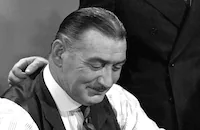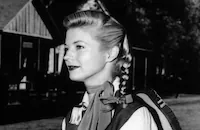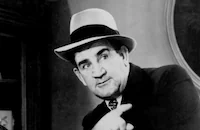The Judge Steps Out

Brief Synopsis
Cast & Crew
Boris Ingster
Alexander Knox
Ann Sothern
George Tobias
Sharyn Moffett
Florence Bates
Film Details
Technical Specs

Synopsis
On his birthday, Tom Bailey, a hardworking Boston probate judge, learns from his fellow jurists that he has been assigned to the troublesome Winthrop custody case. Tom then discovers that his wife Evelyn and grown daughter Catherine have forgotten his birthday, but have bought expensive hats for themselves. Claiming that he is merely following the dictates of the law, Tom rules against Joan Winthrop, a widow from a lower-class family who is fighting with her rich father-in-law for custody of her son. Later, Evelyn informs Tom that Catherine has become engaged to wealthy heir John Struthers III and must have fine clothes for her trousseau. Although Tom protests his wife's extravagances and social ambitions, he pays for a lavish wedding and agrees to consider a job as chief counsel at John's father's bank. On the train to Washington, D.C., however, where he is to do some preliminary work for Struthers, Tom feels suddenly ill and disembarks in the next town. There Tom is told by small-town doctor Charles P. Boyd that his only problem is an unfulfilling home life. Tom protests Boyd's diagnosis, but finally accepts his offer to go fishing for a few days. The absentminded Tom forgets to mail Evelyn a telegram explaining his change of plans and is shocked to read in the newspaper three days later that he has been reported missing. As Tom is boarding a Boston-bound train, he gives Boyd another telegram to send to Evelyn, but the stubborn doctor tears it up. When Tom finally arrives at his house, he overhears Evelyn nonchalantly discussing his disappearance with her friends and, without revealing himself, turns and leaves. Sometime later, Tom, now a drifter, arrives in central California and meets Peggy, the divorced owner of a roadside diner. The kindhearted Peggy at first believes that Tom, who calls himself Tom Brown, is a petty thief, but soon deduces that he is both honest and educated. Respecting Tom's desire for privacy, Peggy asks him no questions and offers him a job as a short-order cook. Soon, Tom is reveling in the tranquility of his new life and begins dating the popular Peggy. After he realizes he has fallen in love with her, Tom feels compelled to reveal that he is married. Although Peggy insists that Tom's marital status is unimportant to her, Tom is disturbed by the situation. When Peggy then learns that her application to adopt Nan, an orphan she has befriended, has been rejected because she is single and runs a diner, Tom becomes determined to obtain a divorce and marry her. After assuring Peggy he will return soon, Tom goes to Boston and finds that, during his absence, Catherine has given birth, and in her reduced circumstances, Evelyn has become a kind and thoughtful woman. The reformed Tom then determines to overturn his Winthrop decision, which is being appealed by Mrs. Winthrop. With help from his loyal assistant, Hector Brown, Tom scours his law books for a precedent with which to reverse his own ruling, but is unsuccessful. Tom is about to concede defeat when Peggy calls and inadvertently uses the word "prejudice" to describe his old attitudes. Inspired, Tom rushes to the courthouse and convinces the panel of judges that his previous decision was invalid because he was prejudiced against Mrs. Winthrop. The case eventually winds up in the state Supreme Court, where Mrs. Winthrop is finally awarded custody. Back in California, Peggy learns that, as a result of Tom's legal success, she will be allowed to adopt Nan. Tom is then offered a position on the Supreme Court, but turns it down, still determined to return to Peggy. To complete his mission, Tom signs his divorce papers and says goodbye to Evelyn, whose dignified graciousness deeply touches him. At the train station, Tom overhears a woman referring to him as an "old man" and suddenly begins to re-evaluate his recent life. Realizing that his time in California was only an "Indian summer," Tom is about to leave the station when he is stopped by Peggy, who has flown to Boston to see him. Peggy, too, has become convinced that his place is with his family and his courtroom, and nobly insists that he remain in Boston. Acknowledging the wisdom of her words, Tom gives Peggy his train ticket and, after bidding her a sad farewell, returns home for good.

Director

Boris Ingster
Cast

Alexander Knox

Ann Sothern

George Tobias

Sharyn Moffett

Florence Bates

Frieda Inescourt

Myrna Dell

Ian Wolfe

H. B. Warner

Martha Hyer
James Warren
Whitford Kane
Harry Hayden
Anita Bolster
Harry Harvey Butler
Leza Holland
Ruth Lee
Jack Lee
Mary Gordon
Elena Warren
Fred Nurney
Charles Flynn
Paul Bryar
Mickey Simpson
Jean "babe" London

Ellen Corby
Joan Wells
James Moffett

Billy Gray
Carol Leeds
Peggy Miller
Robert Bray
Tom Fadden

William Davidson
Ben Erway
Douglas Wood
Jack Gargan

Edward Keane
Earl Dewey

Gail Davis
Richard Powers

Paul Harvey
George Chandler
Norman Mayes
Boyd Cabeen
Mary Forbes
Mary Newton

Lillian Bronson

John Hamilton
George Meader
Broderick O'farrell
Ivan Browning
Robert Clarke
Ray Toone
Don Kerr
Graham Covert
Paul Everton

Russell Hicks
Milton Parsons
Elmer Jerome
Charles Miller
Boyd Davis
George Carleton

Tom Kennedy
Carl Kaulkner
Phil Dunham
Crew
C. Bakaleinikoff
Gordon Bau
Charles Burke
M. S. Burns
James Casey
Russell A. Cully
Albert S. D'agostino
Harry D'arcy
Ruby Felker
Robert De Grasse
Feild Gray
Leigh Harline
Karl Herlinger Jr.
Boris Ingster
Boris Ingster
Alexander Knox
Michel Kraike
Anna Malin
Les Millbrook
Jack Mills
Clem Portman
Sid Rogell
Hazel Rogers
Ollie Sigurdson
Darrell Silvera
Edward Stevenson
Mercy Weireter
Frank Williams
Earl A. Wolcott

Film Details
Technical Specs

Articles
The Judge Steps Out
By Frank Miller

The Judge Steps Out
Quotes
Trivia
Notes
The working title of this film was Indian Summer. According to Hollywood Reporter news item, production on the picture was delayed for six months. Although the film was completed in March 1947, RKO held up its American release until June 1949. RKO borrowed Alexander Knox from Columbia for the production and Ann Sothern from M-G-M.














